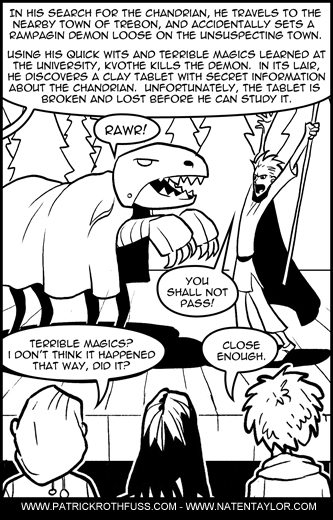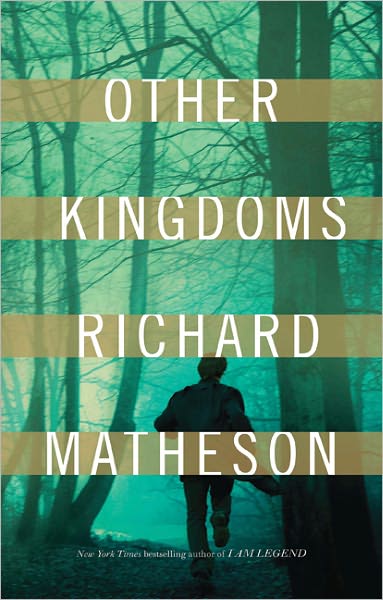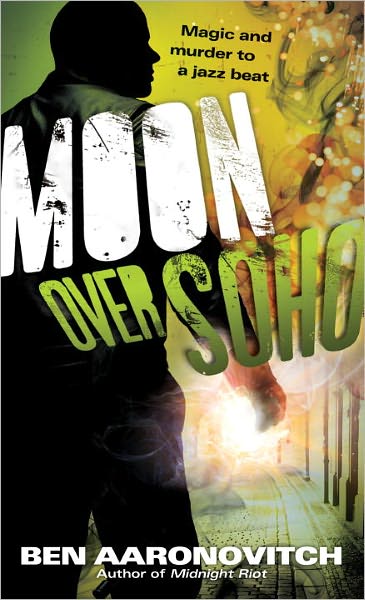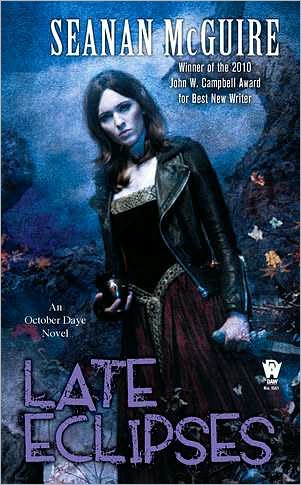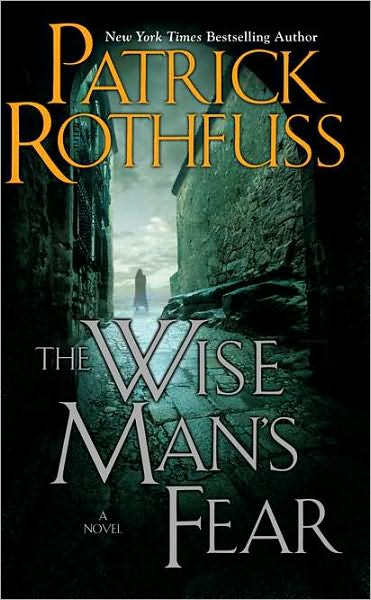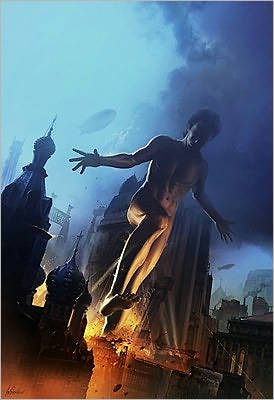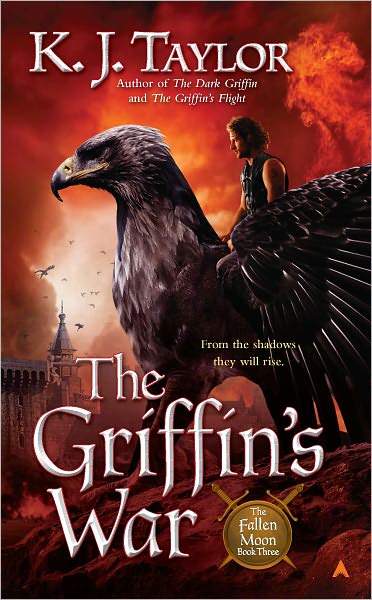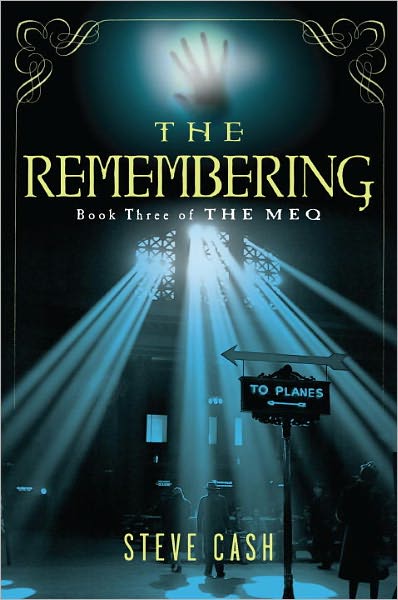Since
The Wise Man's Fear the second book in
Patrick Rothfuss's
Kingkiller Chronicles, publishes next week, I figured now would be as good a time as any to start a new semi-regular feature here at my blog. I'll call that feature
Series Launch, whereby I'll post up a review/overview of the first book in an ongoing series.
So, without further ado, here's my review of
The Name of the Wind, which originally
posted/published at SFFWorld in February 2007, months prior to the release of the novel.
The last few years have proven good for fantasy fiction from new voices, with writers like R. Scott Bakker, Scott Lynch, Hal Duncan, and Joe Abercrombie bursting onto the scene. This year THE book, debut or otherwise, is likely to be
The Name of the Wind, by first time novelist Patrick Rothfuss. Rotfhuss does not spin the genre on its rear in the same way, he simply tells a wonderful, story of fantasy. When the publisher, Elizabeth Wollheim, uses as the cover of the advanced reading copy a letter proclaiming the book the best debut she’s read in thirty years, comparing Rothfuss to George R.R. Martin and Tad Williams, then you know you might be holding a special book in your hands. Rothfuss has crafted an incredible, rich and realistic story with this novel. Though
The Name of the Wind is not a humorous novel, Rothfuss, like Scott Lynch, adds humor in the right doses and in the right spots. He doesn’t stray too far from the tropes of the genre, he embraces them, he makes them his own. That in itself is a cliché for many reviews, but it works for Rothfuss. As for some of the main ingredients for the book, what does it have? A young orphan? Check. A school of magic? Check. While it may sound familiar, Rothfuss doesn’t allow his story to rest on these ingredients. Like a master chef, he adds ingredients, both subtle and powerful, to create a delicious stew of his own creation. When this creation is pared back down to its bare bones, it is essentially the chronicle of a legend, from his happy beginnings with his family as a troupe of traveling entertainers swiftly ended by a band of marauders, to his life on the streets then to his time in the University where truly starts on his road to powerful, near mythical wizard.

Many of the things Rothfuss does are indeed subtle. The story starts rather typically – an innkeeper, Kote, tends to his customers in a comfortable setting. When a dark creature enters the inn and is destroyed by strange means, things come to be more clear. For one, the innkeeper is not an innkeeper at all, he is the legendary wizard Kvothe. Again, this is not an entirely new idea; hide your legend/protagonist in plain sight. After the first thirty to fifty pages of this impressive tome, Rothfuss is telling the reader things aren’t exactly what they seem and what lies under the surface is much more interesting than it would otherwise seem. Rotfhuss does a superb job of drawing the reader into the familiar and comfortable story, a familiar feeling story, until he changes gears and keeps the reader hooked in even more. He does this both in the focus of the story and the narrative voice, switching from third person omniscient to first person narrative, allowing the protagonist to tell his own story.
As Kvothe begins to reveal his life story, each detail is a spice that compliments the one which preceded it. As a part of a traveling group of mummers, young Kvothe took to the lute and music became an important foundation of his later life. Another important aspect of Kvothe’s life, and the novel itself, is the power of story. After all, the majority of this novel is told as a story by Kvothe to a historical chronicler. From the stories Kvothe recalls his father telling, to the stories and plays his family put on for eager crowds, entrancing an audience of either one (like a reader) to an audience of man many, factors powerfully. Also during these formative days does Kvothe gain a fascination and appreciation of Magic. Kvothe invites an elderly man named Abenthy (Ben), who shows hints of magic, the troupe encounters on their travels to join the troupe. It isn’t long before Kvothe soon effectively becomes the man’s apprentice. Ben tells Kvothe of the magic and great things he can learn at the University, and how Kvothe’s skill with the lute is one indicator of how much potential he might have at the University and with the craft of Magic. Kvothe cannot douse this flame of interest.
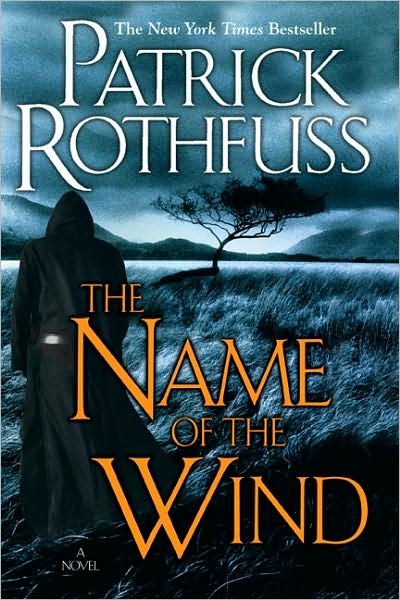
Like Rotfhuss’s shift in narrative voice early in the novel, Kvothe’s life soon shifts, though this is a major turn for the worse. His troupe has an encounter with a seemingly random group of marauders. Like the story itself, these marauders are more than they seem. Kvothe gets only a hint; his father was telling the wrong stories, stories about the mysterious people known as the Chandrian. Kvothe soon hitches a ride to Tarbeam, a sizeable city where he becomes a street urchin, living only by his wits and bare feet. Kvothe eventually leaves the streets and journeys to make his bid for entry in the University. Along the way, he falls in with a caravan where he meets a lovely, enchanting woman named Denna. He is faced with a hard decision when the caravan arrives at Imre, the young woman, Kvothe says goodbye to Denna and the scene is one of few that plays out a bit too clichéd.
Once in the University, Kvothe encounters several hurdles as he is introduced to scholarly life. The picture Rothfuss paints of the University, again, comes through not as a many-detailed thing, focusing on the minutia. The world comes through as part of the story, not something separate. Through Kvothe’s eyes, the University seems both a marvel and a thing of frustration, giving him a situation not unlike having your cake, but not being able to eat it. Or rather, running for miles before you can actually eat it. Here, Kvothe soon relies on the acting skills he learned when his parents were alive. More importantly; however, Kvothe’s skill and the knowledge of magic he gained under Ben more than gets him through his tough situations, these skills with magic are precisely what gains him entrance into the University. Some elements which may be considered “legendary” are played out in the University.
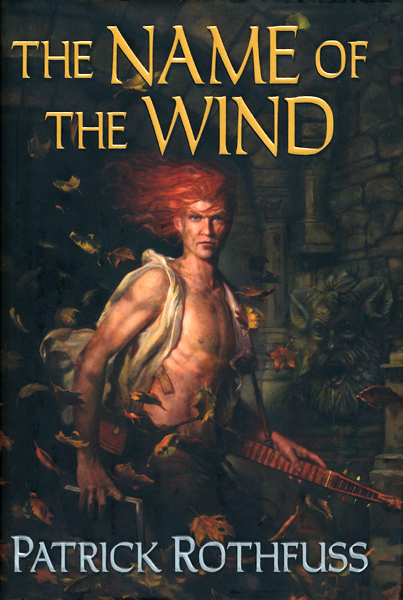
The structure of the book is something to be noted again. The majority of the story taking place at the University, Rotfhuss allows Kvothe to tell most of the story, providing for first person narrative. The brief interludes when Kvothe pauses his story and the novel returns to the third person omniscient, provide great hints of what is to come in Kvothe’s narrative. This switch in narrative voice is not unlike Matthew Stover’s Heroes Die, wherein the scenes when Hari is Caine in Overworld are first person, and the scenes of Hari in the “real world” are third person. Since the story is primarily told from the first person narrative, two other authors draw immediate comparison – Robin Hobb and Gene Wolfe. Both are writers who excel with such viewpoint narratives and moreso with Hobb do the similarities seem strongest. Like her Shaman’s Crossing, the elements of young men coming of together in a closed setting set the tone for
The Name of the Wind. Rothfuss’s debut also has a feel similar to Hobb’s Assassin’s Apprentice, with the orphaned youth living in the shadows of “normal” life. Where Rotfhuss’s novel moves into Wolfe territory is the reliability of the narrator. Wolfe is widely known for his unreliable narrators. It may be too early in Rothfuss’s career to know how reliable his narrator, Kvothe, is, but this question cannot be forgotten when the protagonist/narrator was born into a family of actors and performers, and admits to using such skills throughout the narrative.
There are only a few nagging points about this otherwise impressive novel. At times, Kvothe just happens to have knowledge of everything. Whatever crosses his path, he seems to know something about it. While the novel is approximately 900 pages, only on one or two occasions does Rothfuss become too indulgent with the details. Otherwise, the story is just the right length, it is a story one does not want to end as Rothfuss does a wonderful job of immersing the reader in Kvothe’s world and with Kvothe.

Where will
The Name of the Wind stand at year’s end and over the next few years in the genre? At least for this year, Rothfuss has set the bar very high for any other author publishing their first novel in 2007. As for where the book will stand in the years to come, it will likely stand as the start of one of the bright careers in fantasy fiction. Suffice it to say, the book is very good and has all the elements of greatness – characters with which the reader can empathize, a fascinating backdrop where these characters live, and the key ingredient: leaving the reader wanting for more. Since this is just the first book in a trilogy, that want will be met.
© 2007 Rob H. Bedford
